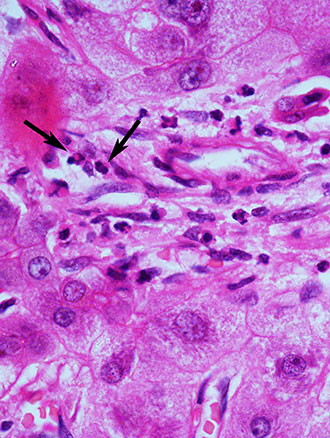April
‘When good cells turn bad’ - immune cells can promote liver cancer

A team of Newcastle University scientists have found that specialised immune cells in our bodies that normally act to protect us from infections can have a dark side in the development of liver cancer.
In a paper published in the journal Nature Communications, the team describes how cells called neutrophils can promote cancer-inducing effects in liver cells that are already damaged due to chronic disease.
It is already known that chronic liver inflammation or hepatitis are risk factors for developing a particular type of liver cancer known as hepatocellular carcinoma (HCC). However, inflammation is a complicated process involving many different types of cells from our immune system working together. This has made it difficult to determine the molecular links between inflammation and HCC.
This latest research identified neutrophils as a key inflammatory cell type that drives the progression of liver damage to cancer in mice. The team at Newcastle University’s Institute of Cellular Medicine - Derek Mann, Professor of Hepatology, Dr Fiona Oakley and Dr Caroline Wilson - showed that among the effects that neutrophils produce, is an increase in Reactive Oxygen Species (ROS), part of normal cell metabolism which at low levels helps the body’s immune system but which can cause damage to cellular components, including damage to DNA, if they reach high levels.
Professor Mann explains: “Neutrophils normally help our bodies to fight infections by producing powerful substances that kill germs. They are also sent to our liver when it is damaged by substances like alcohol, only in this scenario, when the liver is being subjected to sustained damage on an ongoing basis, there is a continuous flow of neutrophils to the damaged site. This overwhelming response, and the flood of germ-killing molecules the neutrophils release, can actually harm the genetic material in liver cells and stimulate cancer growth.”
The research, which was jointly funded by the European Commission, Medical Research Council and the Wellcome Trust, also suggested a possible way towards stopping the cancer-promoting actions of neutrophils. Dr Oakley added: “We found that neutrophils cause an increase in ROS in liver cells and this damages their DNA which can be a trigger for cancer growth. Remarkably, anti-oxidants were able to almost completely stop HCC in our experiments”
Dr Mann commented: “Now we know that neutrophils are the culprits we can move forward with new studies aimed at stopping their cancer-promoting activities in high risk patients suffering from severe liver disease. We need to develop our understanding of how we might be able to prevent ongoing neutrophil traffic to the liver, or block the release of ROS. We also need to carry out more work to understand how we might be able to use anti-oxidants, naturally found in fruits and vegetables.”
Liver cancer is a devastating disease with a poor prognosis and limited therapeutic options. The World Health Organisation estimate that liver cancer was the second leading cause of cancer deaths in 2012, accounting for almost 750,000 deaths worldwide.
The article, ‘NF?B1 is a suppressor of Neutrophil Driven Hepatocellular Carcinoma’ is published on 16 April 2015 in Nature Communications.
Pictured: A Haematoxylin and Eosin stained human liver with liver cancer, shown at 600x magnification. The arrows point to neutrophils.
published on: 16 April 2015
